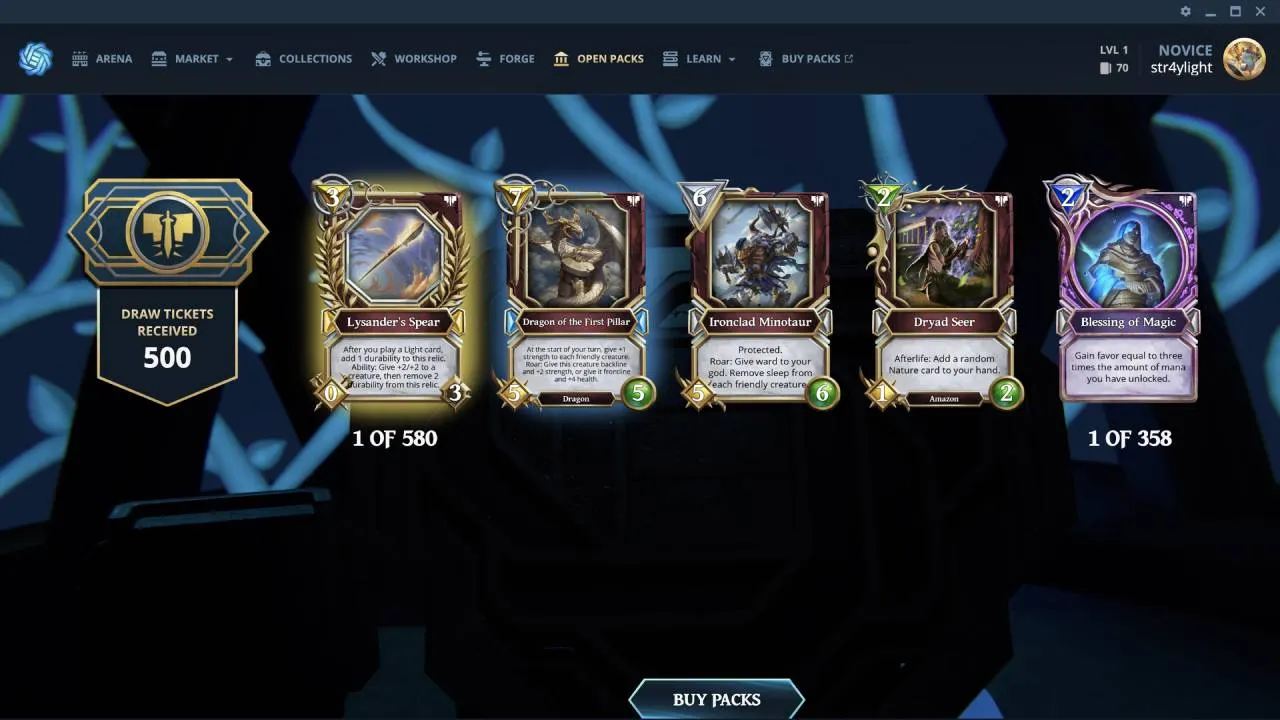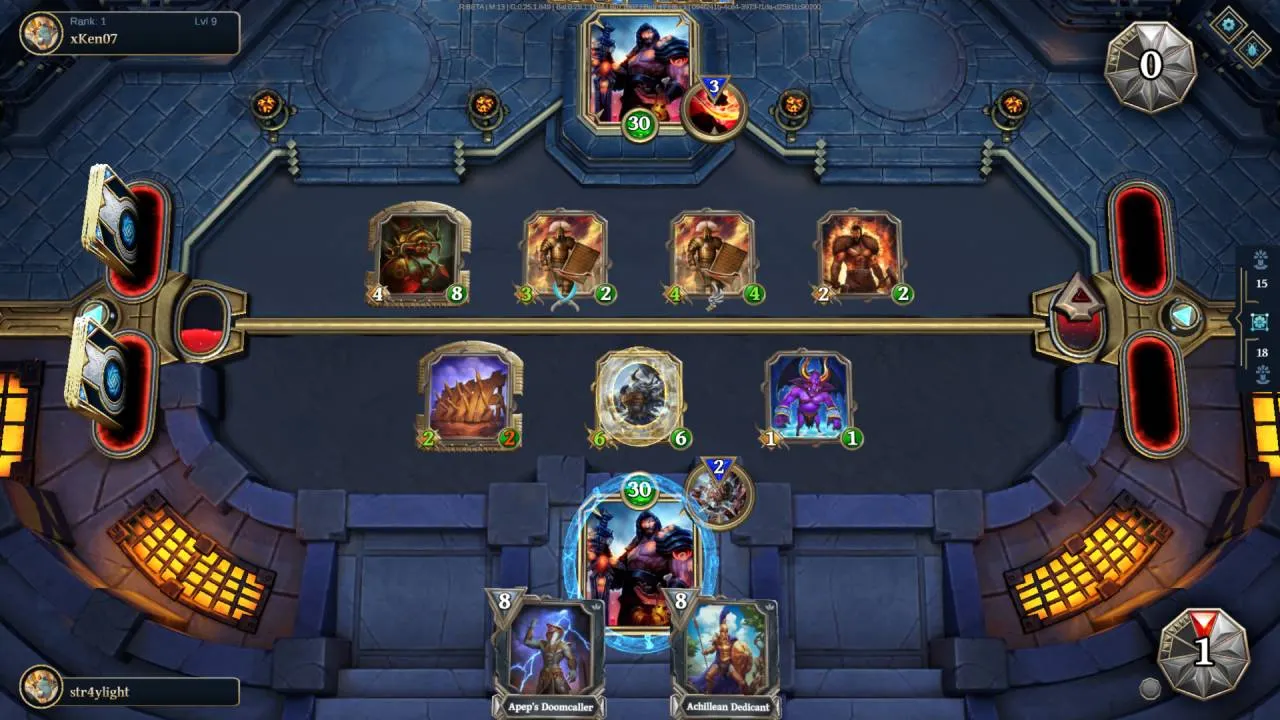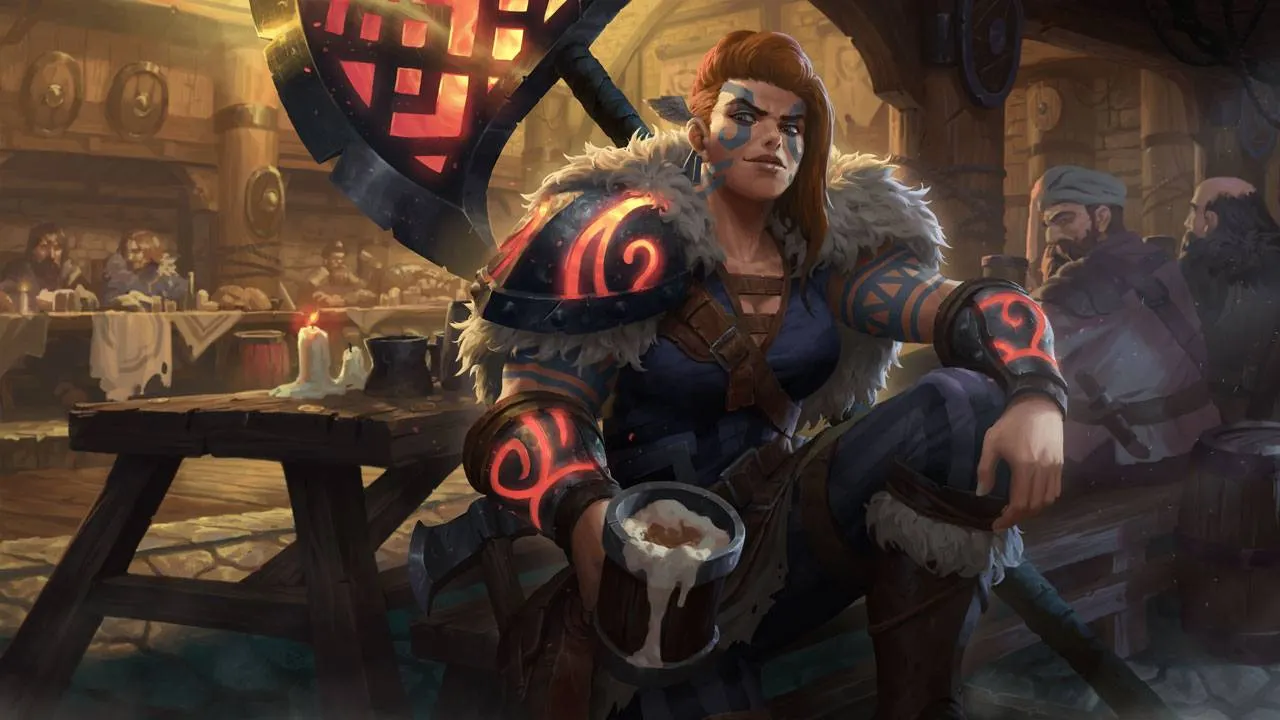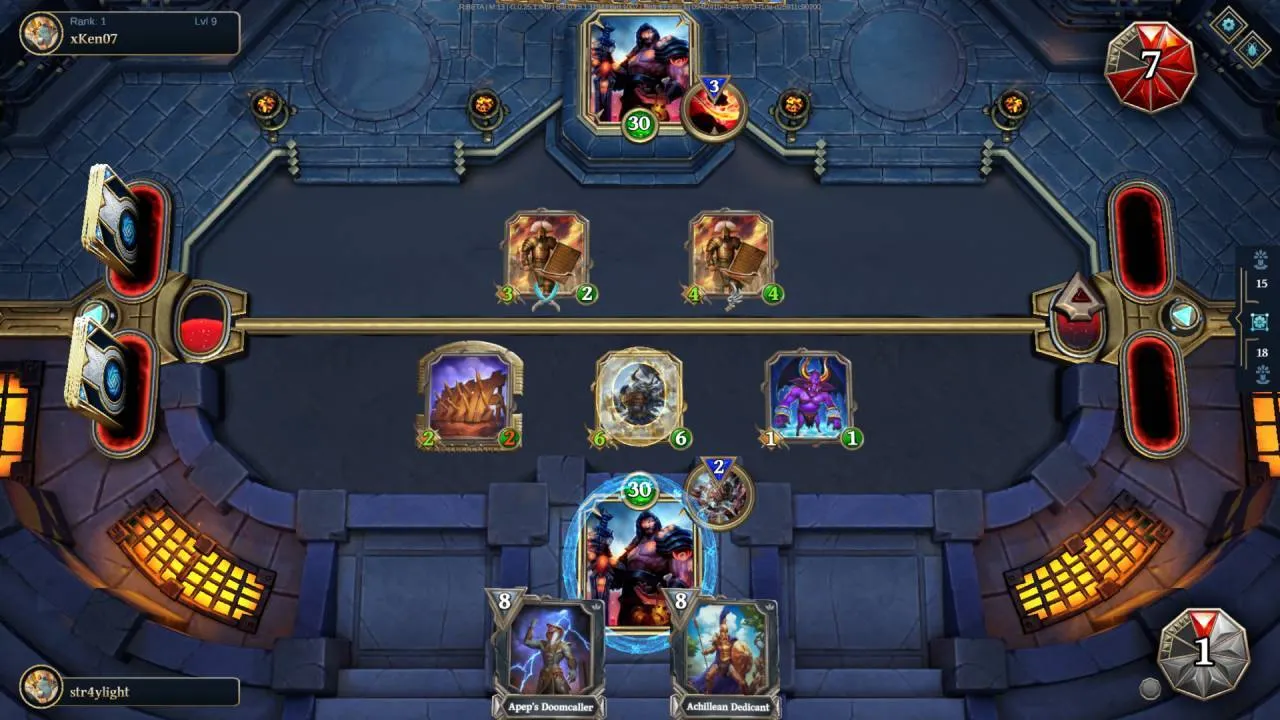In brief
- Gods Unchained is a turn-based, fantasy card game in the vein of Hearthstone and The Elder Scrolls: Legends.
- The game's blockchain-based cards are non-fungible tokens, meaning that each card is unique and can be traded on the open market.
- It's an engaging and solidly polished product, though its onboarding and tutorial process could be improved.
Gods Unchained is one of the most prominent crypto-infused games to date, delivering an online collectible card game experience in which you verifiably own the cards, which are tokenized digital assets on the Ethereum blockchain.
That means that you can buy and sell the cards, which range in rarity and value just like physical card games.
The free-to-play game itself is much like Blizzard’s immensely popular Hearthstone: Heroes of Warcraft, with fantasy-themed character and unit cards that you’ll play turn by turn in an effort to defeat your enemy. It’s a pretty close copy of Hearthstone, actually, which means it’ll be an easy transition for those already familiar with the game, albeit now with a crypto edge.
Curious where to start? Here’s a look at how Gods Unchained works, how to play it, and whether you should invest your time and money in Immutable’s PC and Mac card game.
How does Gods Unchained work?
Gods Unchained’s turn-based card-battling gameplay isn’t based on blockchain—it’s the cards themselves that are powered by the technology. Each non-common card is individually tokenized as a non-fungible token (NFT), a digital asset that can be verifiably authenticated and bought and sold as you please.

In most games, including rivals like Hearthstone and The Elder Scrolls: Legends, the cards are simply part of the game experience owned and provided to you by the publisher. There’s no true ownership of them.
Gods Unchained instead mimics the physical card games that inspired those digital versions, such as Magic: The Gathering, by letting you buy and sell individual cards. Just like with physical card games, rare digital cards in Gods Unchained can be very valuable; in February 2019, a "Mythic" card sold for a whopping $62,000.
How to buy Gods Unchained cards
When you start the game, you’ll begin with 70 free cards that allow you to use the various basic decks in the game. Many more cards are available via expansion packs. You’ll earn card packs as you rank up by playing matches, plus you can purchase additional packs with real money to obtain random additions to your collection.
Packs are sold in Rare, Epic, Legendary, and Shiny-Legendary variations. As of this writing, those packs sell for $2.49, $6.99, $24.99, and $149.99, respectively, and each offers just five cards at different rarity levels.
Immutable also sells chests that contain six packs apiece, available in Rare ($14.99) and Legendary ($149.99) varieties. The difference from simply buying multiple individual packs is that chests can be held onto and traded at a later date, potentially increasing their value.
Meanwhile, individual cards can be bought and sold via the in-game Marketplace, providing an opportunity to improve your deck with key additions or potentially profit by selling off rare and/or duplicate cards. To do any of this, whether it’s buying packs or buying/selling cards, you will need to link an Ethereum wallet (such as MetaMask) to the game. This allows you to utilize any Gods Unchained cards and items in your wallet within the game itself.
You’ll need ETH to purchase anything in the game, and you can buy it via the game’s Wyre plug-in if you don’t already have the cryptocurrency in your wallet.
How to play Gods Unchained
Gods Unchained is a streamlined, competitive trading card game that is very much in the vein of Hearthstone, an incredibly popular game that boasted more than 100 million players as of 2018 and has a robust, international esports scene. For the most part, Gods Unchained follows that format closely, with only small tweaks to the flow of combat.
You’ll enter into battle with a 30-card deck that fits the theme of one of six gods, whether it’s one of the premade decks or your own, and take turns back and forth with your opponent.
You’ll begin each turn with a certain amount of mana to spend on playing cards from your hand or using god abilities, and the amount you have gradually increases over the course of the game, allowing for more powerful cards in the late game. One twist that Gods Unchained introduces is a mana lock that slows how rapidly that tally increases after the first five turns, allowing for more back-and-forth before top-tier cards come into play.

Each player’s god starts with 30 health, and the goal is simply to kill your opponent before he or she can do the same to you. That’s more easily said than done, however, since card-battlers like these have a rock-paper-scissors type of flow that often makes them slow-paced and strategic, although the tide of war can turn much more rapidly in the later stages. And if you have an ineffective deck, you’ll probably learn very quickly where the holes are! Workshopping new decks is a big part of the fun, really.
Design and UX

Gods Unchained has an appealing fantasy aesthetic that seems to take inspiration from both Hearthstone and Magic: The Gathering, pairing the obvious user interface and structural influence of the former with a card art style that reminds me more of the latter. Getting around the menu system is pretty straightforward, and interacting on the game board is easy to figure out as well.
Ease of use
While Gods Unchained could surely benefit from a smoother and more gradual onboarding process, it's easy enough to figure out the core mechanics simply by playing a couple of matches against the AI before hopping into online ranked matches.
The same kind of gradual ramp-up would be handy for setting up a wallet, too, especially for anyone who isn’t already knowledgeable about Ethereum and cryptocurrency. Immutable has published plenty of information about the game, the economy, and use of blockchain, but much of it is accessed by clicking a link that takes you out of the game. It would be great to see more of that smoothly implemented into the game interface itself.
Features and future outlook
As of this writing, Gods Unchained is still a relatively young game. It opened up in beta in mid-2019 and only recently launched Trial of the Gods, its “first season” expansion to the core game. Hearthstone had a five-year start on the game and has thus far released more than 2,600 cards, so if Gods Unchained were to follow a similar kind of rollout, there’s still a lot of runway for the game to expand and be enhanced while introducing additional modes.
🎉 The new expansion set has arrived! The gods have shown their hand, it's up to you to decide how it plays out.
⚡ Get in early for 15% off cards & packs during the first week of sales ⚡https://t.co/DdqjkghLfM pic.twitter.com/DdEAWZK54V
— Gods Unchained (@GodsUnchained) September 10, 2020
Immutable plans to bring the game to mobile devices and tablets, which should not only help introduce Gods Unchained to many more players, but also provide a convenient way for all players to enjoy battles wherever they please. The company is also developing its own Immutable X scaling infrastructure to help the game grow without bogging down the Ethereum mainnet.
One particular hang-up that could push some players off of the game is the current high cost of Ethereum transactions. The gas fee can significantly boost the cost of packs. For example, when I purchased a $25 Legendary pack, the gas fee ultimately boosted the total to $32.50. Newcomers may not understand the need for the fee, let alone the reason why it’s so high.
Costs for creating and exchanging NFTs are too damn high, and we realized a while ago that if we were serious about taking @GodsUnchained mainstream we needed a solution. Sidechains suck, and switching away from Ethereum to another blockchain was (and still is) laughable.
— Immutable (@Immutable) October 21, 2020
Luckily, Immutable understands this: in a recent tweet thread about Immutable X, the company said, “Costs for creating and exchanging NFTs are too damn high, and we realized a while ago that if we were serious about taking Gods Unchained mainstream we needed a solution.” That’s little solace for users spending money now, although hopefully their investment in cards today will pay off in the long term.
Verdict
Gods Unchained may not be the most original digital strategy card game out there, but the addition of crypto economics adds a potentially compelling twist to what is already a really engaging and solidly polished free-to-play experience. In time, I hope to see an improved onboarding and tutorial process to help newcomers understand the full extent of that experience, without having to read external FAQs and blog posts.
Additionally, high Ethereum gas fees have the potential to bounce players off of the game right at the moment when they’re willing to invest real money and become more engaged, but luckily that is an issue that Immutable has acknowledged and is working to address. Even so, the core game is already strong in its current state, and there’s a lot of potential for Immutable to further develop Gods Unchained into a major player in the digital card game space.
Rating: 4/5

